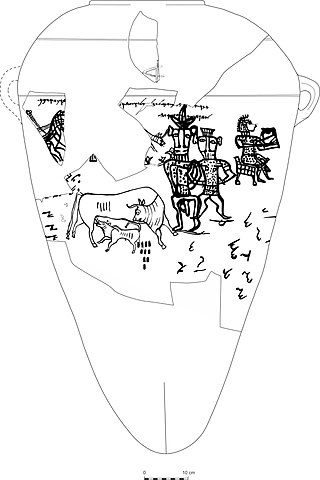Yahwistic may refer to:
- Named after Yahweh; see Theophory in the Bible § Yah theophory
- Relating to Yahwism, a religion in ancient Israel and Judah
- Relating to the Jahwist, a source of the Pentateuch
Yahwistic may refer to:
Joel or Yoel is a name meaning "Yahweh Is God" in Hebrew and may refer to:
Micah is a given name.

Yahweh was an ancient Levantine deity, the national god of the Israelite kingdoms of Israel and Judah, and later the god of Judaism and its other descendant Abrahamic religions. Though no consensus exists regarding the deity's origins, scholars generally contend that Yahweh is associated with Seir, Edom, Paran and Teman, and later with Canaan. The origins of his worship reach at least to the early Iron Age, and likely to the Late Bronze Age, if not somewhat earlier.

Baal, or Baʻal, was a title and honorific meaning 'owner' or 'lord' in the Northwest Semitic languages spoken in the Levant during antiquity. From its use among people, it came to be applied to gods. Scholars previously associated the theonym with solar cults and with a variety of unrelated patron deities, but inscriptions have shown that the name Ba'al was particularly associated with the storm and fertility god Hadad and his local manifestations.

El is a Northwest Semitic word meaning 'god' or 'deity', or referring to any one of multiple major ancient Near Eastern deities. A rarer form, 'ila, represents the predicate form in the Old Akkadian and Amorite languages. The word is derived from the Proto-Semitic *ʔil-.
Jah or Yah is a short form of the tetragrammaton יהוה (YHWH), the personal name of God: Yahweh, which the ancient Israelites used. The conventional Christian English pronunciation of Jah is, even though the letter J here transliterates the palatal approximant. The spelling Yah is designed to make the pronunciation explicit in an English-language context, especially for Christians who may not use Hebrew regularly during prayer and study.
Jehovist may refer to:
Jewish temple may refer to:
Theophory is the practice of embedding the name of a god or a deity in, usually, a proper name. Much Hebrew theophory occurs in the Bible, particularly in the Old Testament. The most prominent theophory involves names referring to:
Yah may refer to:
A theophoric name embeds the word equivalent of 'god' or God's name in a person's name, reflecting something about the character of the person so named in relation to that deity. For example, names embedding Apollo, such as Apollonios or Apollodorus, existed in Greek antiquity.
Obadiah is a Biblical prophet whose name means "servant of Yahweh" or "worshipper of Yahweh".
Yahweh is a reconstruction of the name of the God mentioned in the Hebrew Bible.
Nimshi is a character in the Hebrew Bible. He is mentioned in the Books of Kings and the Second Book of Chronicles as father, grandfather, or possibly a forebear of Jehu, the king of the Northern Kingdom of Israel.

The Sacred Scriptures Bethel Edition (SSBE) is a Sacred Name Bible which uses the names Yahweh and Yahshua in both the Old and New Testaments. It was produced by Jacob O. Meyer, based on the American Standard Version of 1901 and it contains over 977 pages. The Assemblies of Yahweh printed 5,500 copies of the first edition in 1981. It is also used by some members of the Sacred Name Movement.

WMLK is a shortwave radio station in Bethel, Pennsylvania owned by the Assemblies of Yahweh. WMLK derives its callsign from MLK, representing the consonants of the Hebrew word "malak" meaning a "messenger" or angel. A different vocalisation of the word will also yield the definition salt.
Castiel may refer to:
God of Israel may refer to:

The Kenite, or Midianite–Kenite hypothesis, is a hypothesis about the origins of the cult of Yahweh. As a form of Biblical source criticism, it posits that Yahweh was originally a Midianite god whose cult made its way northward to the proto-Israelites.

Yahwism, as it is called by modern scholars, was the religion of ancient Israel and Judah. An ancient Semitic religion of the Iron Age, Yahwism was essentially polytheistic and had a pantheon, with various gods and goddesses being worshipped by the Israelites. At the head of this pantheon was Yahweh, held in an especially high regard as the two Israelite kingdoms' national god. Some scholars hold that the goddess Asherah was worshipped as Yahweh's consort, though other scholars disagree. Following this duo were second-tier gods and goddesses, such as Baal, Shamash, Yarikh, Mot, and Astarte, each of whom had their own priests and prophets and numbered royalty among their devotees.